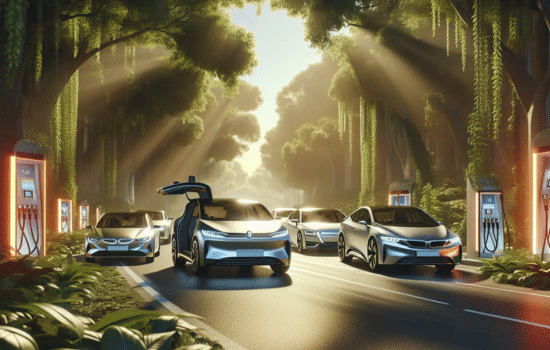Advertisements
The search for vehicles that are not only budget-friendly but also environmentally friendly has become a priority for many environmentally conscious drivers.
In a world where climate change and rising fuel costs are constant concerns, finding a car that offers fuel efficiency is crucial.
Advertisements
This post presents a list of the 10 most fuel-efficient cars available on the market today, providing an ideal option for those looking to save money and reduce their carbon footprint.
This selection will explore models that stand out not only for their low fuel consumption, but also for their performance and eco-friendly features.
Advertisements
From hybrid cars to the latest electric models, each vehicle on this list represents a combination of technological innovation and respect for the environment.
Fuel efficiency not only means spending less on gasoline, but also contributing to the reduction of polluting emissions.
In addition to offering a detailed guide on each of these cars, this post will also delve into how to choose the right model based on each driver's individual needs.
See also:
- The 10 most fuel-efficient cars
- Dance and get fit now!
- Christian music: inspiration on your smartphone
- Top 10 eco-friendly cars
- Learn Korean in a fun way
The importance of considering not only fuel savings but also aspects such as range, maintenance costs, and technological features that can improve the driving experience and increase sustainability will be discussed.
Discovering the most fuel-efficient cars is not only a smart investment for your wallet, but also a significant step toward a more sustainable lifestyle.
So, if the idea is to protect the planet while enjoying a comfortable and economical trip, this list of efficient cars offers the perfect guide to making an informed and responsible decision.
1. The benefits of fuel-efficient cars
Choosing a fuel-efficient vehicle offers numerous benefits for both the consumer's wallet and the environment.
These cars are designed with advanced technologies that maximize the distance traveled per liter of fuel, which translates into lower gasoline or diesel costs.
Furthermore, by consuming less fuel, the emission of polluting gases is reduced, contributing significantly to the protection of the natural environment and reducing the carbon footprint.
In a context where climate change and global warming are critical issues, choosing an eco-friendly vehicle becomes a conscious and responsible decision.
In addition to the economic savings and positive environmental impact, efficient cars typically have optimized performance.
Brands have innovated in aerodynamics and weight reduction, which improves the vehicle's fuel efficiency without compromising comfort and performance. This is particularly important for those seeking a balance between economy and performance.
As the automotive industry moves toward a more sustainable future, fuel-efficient car options are expanding, offering a variety of models and features to suit different consumer needs and preferences.
2. Hybrid Technology: The Perfect Combination
Hybrid technology has established itself as one of the most popular options in the fuel-efficient vehicle space. These vehicles combine an internal combustion engine with one or more electric motors, allowing for more efficient fuel use.
During travel, the electric motor can operate independently or in conjunction with the combustion engine, optimizing energy consumption in various driving conditions.
One of the main benefits of hybrid cars is their ability to recharge the battery through regenerative braking systems, which increases efficiency and reduces dependence on fossil fuels.
The variety of hybrid cars on the market has grown considerably, offering models ranging from compacts to SUVs. This diversity allows consumers to choose vehicles that fit their specific needs without sacrificing efficiency.
Furthermore, improvements in battery technology have allowed for increased range for electric vehicles, making hybrid cars even more attractive for those seeking a transition to more sustainable mobility.
Manufacturers continue to innovate in this field, introducing vehicles with improved capabilities and cleaner technologies.
3. Electric cars: The evolution of sustainable mobility
Electric cars represent a significant evolution toward sustainable mobility. Unlike traditional vehicles, electric vehicles do not rely on fossil fuels but run entirely on electricity stored in batteries.
This feature not only eliminates direct emissions of polluting gases, but also provides a quieter and smoother ride.
Today, advances in battery technology have allowed for a significant increase in the range of these vehicles, making them a viable option for a growing number of consumers.
The electric car market is constantly expanding, with numerous brands offering models that vary in size, design, and features.
From compact sedans to SUVs and luxury vehicles, there's an option for every type of driver. Plus, charging infrastructure is rapidly improving, with public charging stations becoming more accessible and faster, making these vehicles easier to use on a daily basis.
Government incentives also play an important role in promoting electric cars, providing tax breaks and other advantages to encourage their adoption.
4. Optimized combustion engines: Improved efficiency
Despite the growth of electric and hybrid cars, traditional internal combustion engines have not become obsolete.
Technological advances have made it possible to optimize these engines to improve fuel efficiency and reduce emissions. Innovations such as direct fuel injection, the use of turbochargers, and improved engine design have contributed to maximizing performance and reducing fuel consumption.
These optimized engines are found in a wide range of vehicles, from compact cars to pickup trucks, offering consumers an economical and efficient option.
In addition to improvements in engine engineering, manufacturers have also adopted complementary technologies to improve efficiency.
Automatic stop-start systems, which shut off the engine when the vehicle is stopped, and lighter body materials are examples of how fuel consumption is being reduced.
These innovations allow drivers to enjoy more economical driving without having to switch to a hybrid or electric vehicle.
As the industry advances, these engines are expected to become even more efficient and environmentally friendly.
5. Criteria for choosing an efficient car
When considering the purchase of a fuel-efficient car, it's important to consider several criteria to make an informed decision. First and foremost, it's essential to evaluate the type of use the vehicle will be given.
Drivers who travel long distances daily may benefit more from a hybrid or electric car, while those who need a vehicle for short commutes may find sufficient advantages in an optimized combustion engine.
Another key factor is the total cost of ownership. Although electric and hybrid cars may have a higher initial purchase price, the long-term savings in fuel and maintenance can offset this investment.
It's also important to consider the availability of charging infrastructure and government incentives that can reduce the cost of acquisition.
Finally, the vehicle's environmental impact should be a crucial consideration for those wishing to minimize their carbon footprint.
Evaluating full lifecycle emissions, including production and disposal, is essential for making a truly eco-friendly choice.
6. The role of innovation in the automotive industry
Innovation is a key driver in the development of more efficient and sustainable vehicles. The automotive industry is investing significantly in research and development to create vehicles that are not only fuel-efficient but also comply with increasingly stringent environmental regulations.
Artificial intelligence and machine learning are playing a crucial role in designing smarter driving systems that optimize energy use.
Furthermore, collaboration between automakers, technology companies, and governments is driving the advancement of clean technologies.
Creating strategic alliances allows for the sharing of knowledge and resources, accelerating the development of innovative solutions.
For example, autonomous driving systems are being designed to improve driving efficiency and reduce fuel consumption by optimizing routes and efficiently managing traffic. These advances promise a future where mobility will be increasingly sustainable and accessible to all.
7. The importance of consumer education and awareness
For fuel-efficient cars to have a significant impact on the environment, it is crucial that consumers are educated and aware of the benefits and options available.
Consumer education plays an essential role in promoting responsible and sustainable purchasing practices.
Awareness campaigns and education programs can help consumers understand the economic and environmental benefits of choosing an efficient vehicle, as well as the key features to consider when making a purchasing decision.
Furthermore, education must be accompanied by adequate supporting infrastructure, such as the availability of electric vehicle charging stations and access to tax incentives.
Government policies that encourage the purchase of fuel-efficient cars are also critical to increasing their adoption.
By providing clear and accessible information, consumers can make more informed decisions that benefit both their personal finances and the natural environment.
Knowledge empowers consumers to play an active role in the transition to cleaner and more efficient mobility.

Conclusion
In conclusion, opting for one of the 10 most fuel-efficient cars is a smart decision that offers significant economic and environmental benefits.
First, by choosing fuel-efficient vehicles, consumers can experience substantial savings on gasoline or diesel costs, which is an important consideration in household budgets.
Furthermore, these cars not only protect our wallets, but also contribute to environmental protection. By reducing polluting gas emissions, they play a crucial role in combating climate change and reducing our carbon footprint.
Hybrid and electric technology, on the other hand, are revolutionizing the automotive sector, providing cleaner and more efficient alternatives that adapt to diverse consumer needs.
With the expansion of charging infrastructure and government incentives, the adoption of electric vehicles is becoming increasingly viable.
Furthermore, ongoing innovation in optimized combustion engines ensures that even those who haven't fully transitioned to electric vehicles can enjoy improved performance and a lower environmental impact.
Ultimately, choosing an efficient car is a step toward a more sustainable and conscious future, where consumers can enjoy affordable and eco-friendly mobility.
With proper education and public policy support, we can move toward a world where efficiency and sustainability are the norm in the automotive industry.



